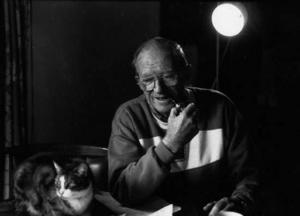 |
Frank Hardy (1917 - 1994)
One bleak afternoon in the winter of 1893 a young man stood in the doorway of a shop in Jackson Street, Carringbush, a suburb of the city of Melbourne, in the Colony of Victoria. The shop was single-fronted and above its narrow door was the sign CUMMIN'S TEA SHOP. In its small window stood a tea-chest with a price ticket leaning against it. The man was of short, solid build and was neatly dressed in a dark-grey suit. His face was clean-shaven. He wore a celluloid collar and a dark tie. With his left hand he was spinning a coin. It was a shiny golden coin, a sovereign.
Standing on the footpath facing him from a few feet away was a tall policeman in uniform, whose small, unintelligent eyes followed the flight of the coin as it spun up a few feet and fell into the palm of the young man's hand, only to spin rhythmically upwards again and again. The policeman said: "This shop is on my beat. I have had complaints that you are conducting an illegal totalisator here."
A cold wind blew through the door fanning against the young man's trouser legs, revealing that he was extremely bow-legged. From a distance, the first noticeable characteristic was his bandiness, but, at close range, his eyes were the striking feature. They were unfathomable, as if cast in metal; steely grey and rather too close together; deepset yet sharp and penetrating. The pear-shaped head and the large-lobbed ears, set too low and too far back, gave him an aggressive look, which was heightened by a round chin and a lick of hair combed back from his high sloping forehead like the crest of a bird. His nose was sharp and straight; under it a thin, hard line was etched for a mouth. He was twenty-four years of age, and his name was John West.
From Power Without Glory by Frank Hardy, 1950
